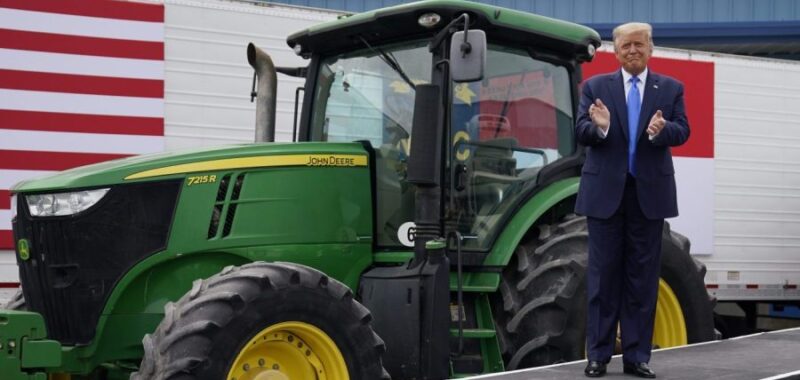
With all the talk about President-elect Donald Trump’s potential retaliation against his enemies in the media and the “deep state,” it is ironic that some of the first to feel the sting of his second term may be among his strongest supporters: American farmers.
Trump announced Monday night that one of his first executive actions would be to impose sweeping tariffs on Mexico, Canada and China.
If this sounds familiar, it should — when Trump levied tariffs on China and the European Union in 2018, they retaliated by placing tariffs specifically on American agricultural products.
To soften the economic blowback, Trump funneled tens of billions of taxpayer dollars to farmers to compensate for lost sales. However, no amount of aid fully addresses the destabilizing effect of disrupted trade. Most farmers would probably prefer a thriving export market over checks from Uncle Sam.
And it’s not only potential retaliatory tariffs that could hurt farmers. Tariffs themselves increase the cost of many essential goods and equipment, such as clothing (which of course we all need), tractors and farming supplies. Additionally, Trump’s other proposed policies — like mass deportation of illegal migrants — could further challenge the agricultural sector, which is already grappling with labor shortages.
Of course, there are logical reasons for agriculture producers to prefer Republican presidents. Farmers have long chafed against land use and regulatory burdens, especially environmental ones, which often intensify under Democratic administrations.
However, the Trump administration’s regulatory policies may be less friendly than expected. For instance, if environmental advocate Robert F. Kennedy Jr. is confirmed as head of Health and Human Services, his promised agenda could significantly disrupt the agricultural sector with stricter standards on pesticides, food additives, seed oils and processed foods.
Maybe Trump won’t follow through on his pledge to let Kennedy “go wild” on food and health policies, which is why Trump’s tariff threats stand out when it comes to potential for upheaval. Trump has a well-documented history of threatening and implementing such measures — as recently as October, he floated the idea of replacing the income tax with revenue from tariffs.
Tariffs serve a multi-pronged purpose for Trump. They’re a convenient way to claim revenue generation whenever funding is questioned for one of his promised policies. At the same time, they’re also a useful cudgel to penalize or threaten foreign or domestic adversaries for not aligning with his policy objectives.
Along those lines, this most recent tariff threat is ostensibly aimed at punishing foreign nations for contributing to the fentanyl crisis. Trump vowed on Truth Social that tariffs will remain in place “until such time as Drugs, in particular Fentanyl, and all Illegal Aliens stop this Invasion of our Country.” (When it comes to Canada and Mexico, at least, the notion that these countries could stop the flow of fentanyl seems dubious.)
Returning to farmers, it’s clear that some of Trump’s policies pose real economic risks. So why did so many voters residing in farming-dependent counties support him?
Like the rest of us, agriculture producers are touched by issues like interest rates and inflation. And while it’s tempting to view voters solely through an economic lens, rural Americans are drawn to Trump not just for materialistic reasons but also for a variety of cultural reasons that could be summed up as wanting to preserve their way of life.
Meanwhile, Democrats are increasingly out of touch with “the heartland” (see Sen. Jon Tester’s recent loss in Montana).
Once upon a time, the Democratic Party was the party of the working man, and white rural farmers were a strong part of President Franklin D. Roosevelt’s coalition.
Historically, tariffs were seen as helpful for Northeast industrial interests and harmful to Southern agrarian interests. Coming into office in the midst of the Great Depression — exacerbated by 1930’s Smoot-Hawley Tariff Act — FDR and Democrats sought to reduce tariffs and liberalize trade, an ethos that dominated the bipartisan consensus until recently.
To be sure, President Joe Biden kept some of Trump’s tariffs when he took office in 2020, so the contrast isn’t perfectly clear. Still, it is worth noting that the party ostensibly of Southerners, farmers and rural Americans is also now the party of tariffs.
All I can conclude is that, for now at least, rural Americans’ votes are based largely on their cultural identities. This may result in some economic tradeoffs.
As the saying goes, we often hurt the ones we love. In this case, however, it’s more accurate to say Trump may hurt the ones who love him.
Matt K. Lewis is a columnist, podcaster and author of the books “Too Dumb to Fail” and “Filthy Rich Politicians.”

